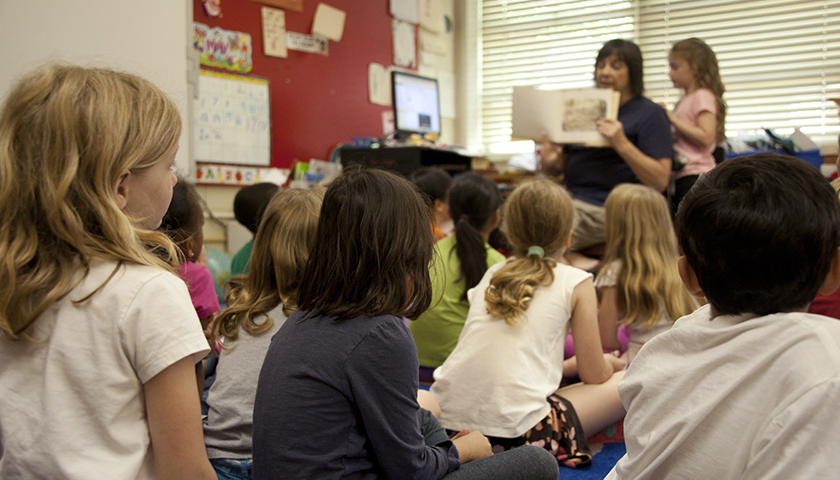Live from Music Row, Wednesday morning on The Tennessee Star Report with Michael Patrick Leahy – broadcast on Nashville’s Talk Radio 98.3 and 1510 WLAC weekdays from 5:00 a.m. to 8:00 a.m. – host Leahy welcomed JC Bowman of Professional Educators of Tennessee to discuss advances in Indiana’s universal school choice program and why Tennessee is falling behind.
Leahy: We are in studio with our good friend, JC Bowman of Professional Educators of Tennessee—the alternative to the teachers’ unions here.
Bowman: They’re actually the alternative to the militant left.
Leahy: There you go. You’re the common sense guy.
Bowman: The piggy bank to the liberal causes.
Leahy: Exactly. The big question for you, JC. Educational savings accounts are often called vouchers. These are big in other states. It has been for Governor Bill Lee the number one thing that he was going to accomplish in education.
And the idea is each student would get, I guess, $7,500 going up to 8,500 bucks that they could take and go to a school of their choice. This is a good thing. Asterisk. We have a story up at The Tennessee Star by our education editor Susan Berry—very good writer.
Bowman: Very good writer.
Leahy: The headline: Indiana expands school choice in nearly all K12 students as Republican-LED states continued momentum. In Indiana, in 2023, they’re going to have 53,000 students participating in their education savings account program. They anticipate that’ll go up to 95,000, which is pretty big. It’s almost like almost 10 percent of the kids there.
Bowman: They may be the largest in the U.S.
Leahy: Yes, they may be. So that is an education savings account school choice success story. Let’s go back to Tennessee. Been very controversial. The bill passed in 2019, was challenged in court. The bill would, the law was upheld by the Tennessee State Supreme Court.
But as of last this current academic year, you could only do it in two counties. Shelby County, Davidson County, and you could only do it for parents of kids in schools that were failing this year. They’ve added Hamilton County for the upcoming academic year.
But the reality is, I looked at the numbers, and there are only 500 kids who are benefiting from this education savings account in Tennessee this academic year, in contrast to 53,000. That is 100 times more in Indiana. Why is Indiana doing so well with this and why are we barely even crawling in Tennessee?
Bowman: I’m going to walk you back to the very beginning. When we were writing some of the early programs on school choice, one of the very first things that happened was that Florida Governor Jeb Bush at the time wanted to do a voucher or a program for 50,000 students in Florida.
And what happened was, I ran some numbers, and they came back. There were only 5,000 empty seats in private schools in the entire state of Florida. So I go back and tell the governor, I said, look, you can write a program for 50,000 people if you want to, but you’re only going to have 5,000 seats. The issue is capacity. You don’t have seats. Now you’re looking in Memphis…
Leahy: What you’re saying is capacity in private schools.
Bowman: Yes. There are no seats. If you were to look in Maury County, for example, Columbia Academy, there’s a waiting list of private schools willing to pay non-voucher-tied money—just money from people wanting to get into the academy. There’s a two-year waiting list.
That’s in Maury County. How are you going to say, oh, yes? You can accept a voucher, and when you get a voucher, there’s gonna be a string attached to it. By the way, you’re gonna have to do A, B, C, and D.
Leahy: So there are some strings that are attached.
Bowman: Yes. Why would you take money from the government, which ultimately, and here’s the other argument? The people would say, look, Bill Gates has an influence in public schools through, various outreaches, Ed Trust, and some of these other groups.
Now he’s going to get his hands into the private schools. So there’s a fear factor involved in that. But it’s the capacity issue. If you’re a mom in Shelby County and you can send your kid to a school one mile away from your house, and you have no dad in the life, you’re a single mom raising a kid, and you’re probably very young.
You may have had him when you were 15 or 16. Why are you going to get up in the morning, get a car, and pay gas prices, thank you to the inflationary prices, which by the way, have come back down to about $3.09, $3.10 a gallon.
Why would you pay money, drive 10 miles out of the way to take your kid to school, and then go back and pick him up for that much money? I just think that it’s a flawed concept in the area of, you lack the capacity.
Leahy: But Indiana apparently doesn’t lack the capacity. What’s the difference?
Bowman: They have better infrastructure. They have small towns where we’ve missed the boat in public schools as we ought to be advocates for public school choice.
Leahy: Charters?
Bowman: No. If I live in Davidson County, drive my kid to a public school in Williamson County, or vice versa? Why can’t we take a kid and allow public school choice if you don’t want to go to…
Leahy: In other words, why are you stuck in Davidson County public schools? Why couldn’t you go from Davidson County to Williamson County, you’re saying? But practically, people aren’t going to do that, though.
Bowman: No. And I’d say in middle Tennessee is a ripe experiment for it because how many people work in the same county?
Leahy: Can I play devil’s advocate?
Bowman: Sure.
Leahy: Really I think the change that would result from that for the student experience would not be that great in many instances. Whereas if you went to a public charter school, like a classical charter school, or if you went to a really good private school, a classical private school, for instance, the change would be dramatic. That’s my argument.
Bowman: But I think you have to put everything on the table. Every single thing has to be on the table. And especially in the area of, if you’re looking at that public school, choice itself has to be on the table. Charter schools are an option.
Leahy: I think that makes sense.
Bowman: Magnet schools. Hey, listen, Hume-Fogg is arguably the top five schools in the United States.
Leahy: Of course, they’re all pushing. Every public school is pushing left-wing propaganda—every single one.
Bowman: We have to figure that out.
Leahy: They’re not teaching the Constitution. We know that because we’ve been doing a Constitution Bee for seven years, and we get like zero support from K-12 public schools here in Tennessee.
Bowman: Let me throw an anomaly at you. I would argue Wilson County is a well-run school system that is trying to do everything right. You’ve got systems out here that are doing the things as correct of Bradley County, I mean my own town.
Leahy: But let me ask you this question though, back to, okay, if there’s a capacity problem in private schools, but Indiana has been able to find 53,000 seats in private schools. For kids taking the ESA and we’ve only found 500 seats. There’s gotta be something else though, going on in Indiana. What is that?
Bowman: The parents are more involved.
Leahy: Why are the parents more involved in Indiana?
Listen to today’s show highlights, including this interview:
– – –
Tune in weekdays from 5:00 – 8:00 a.m. to The Tennessee Star Report with Michael Patrick Leahy on Talk Radio 98.3 FM WLAC 1510. Listen online at iHeart Radio.






I take exception to Mr. Bowman’s example of the Shelby County mom who is unwilling to drive 10 miles to get her kid in a much better school. That may be the case, but it is a bad reflection on the mom, not the school choice option.